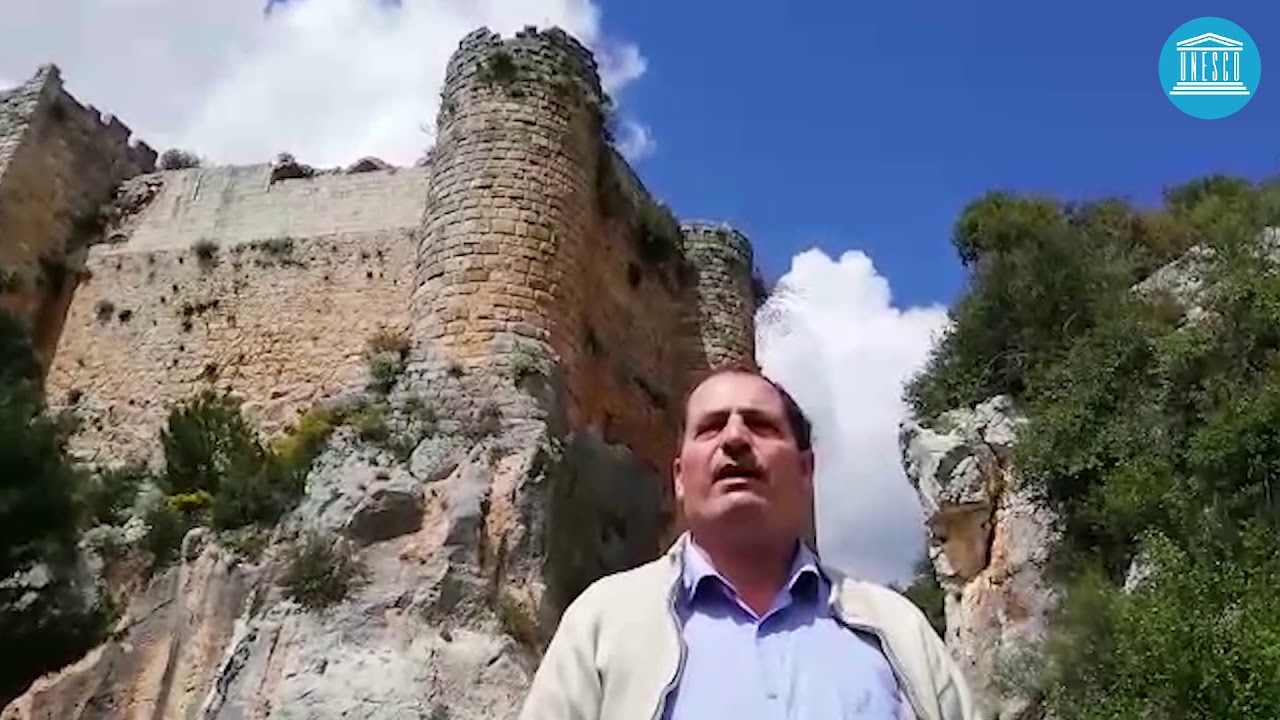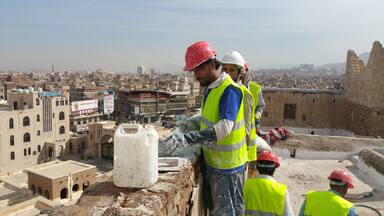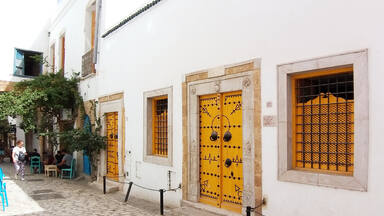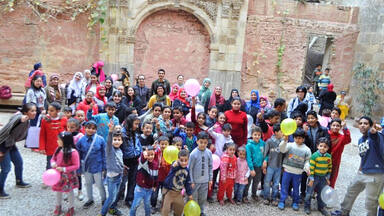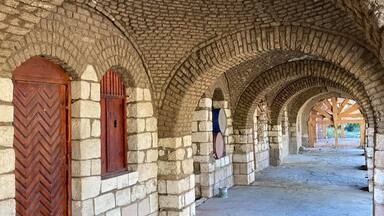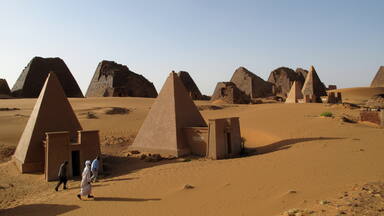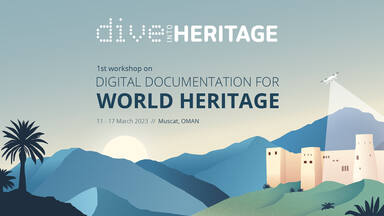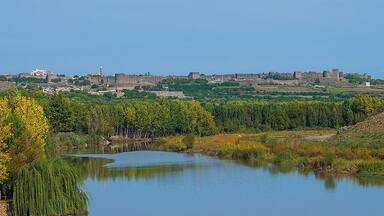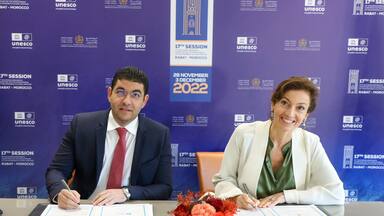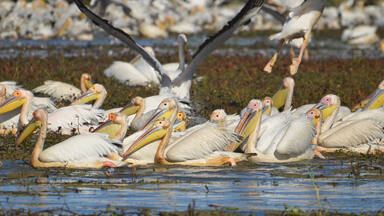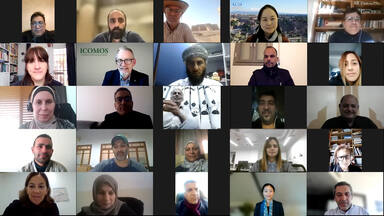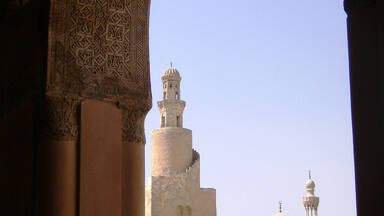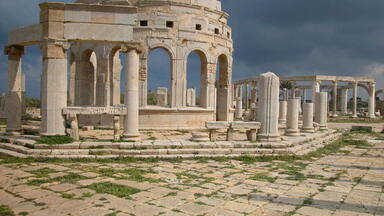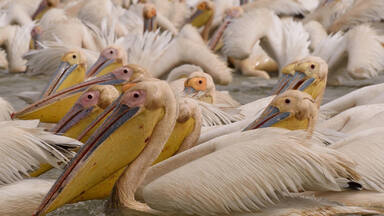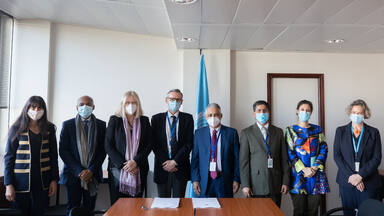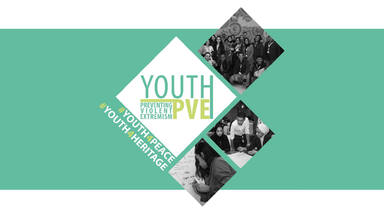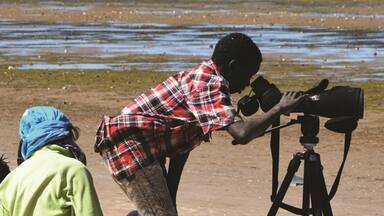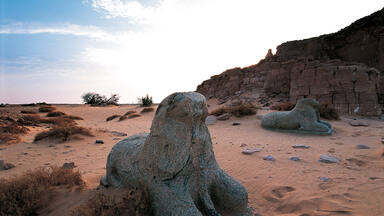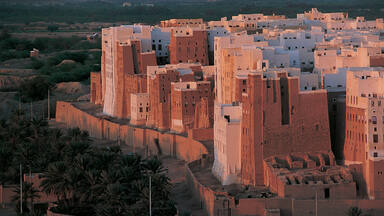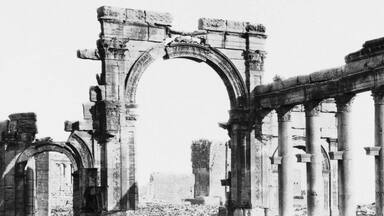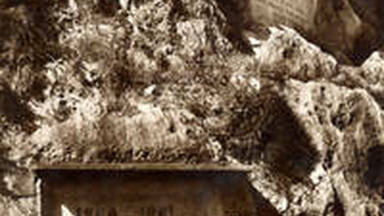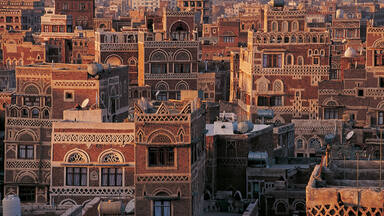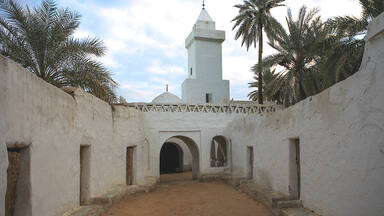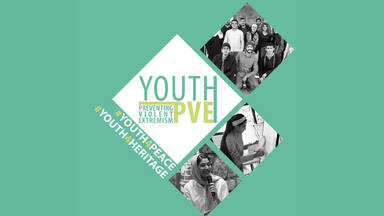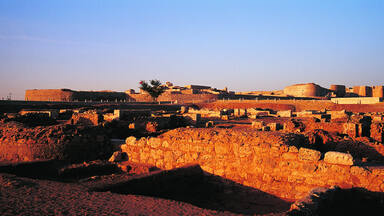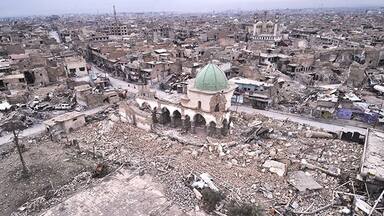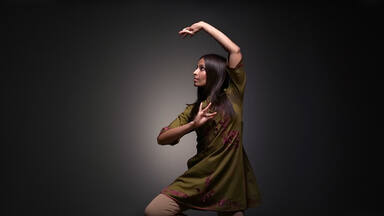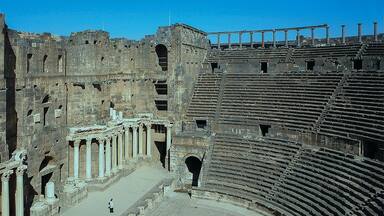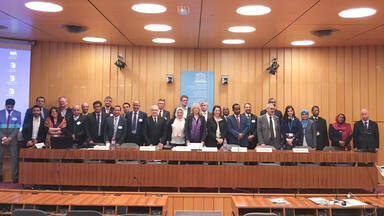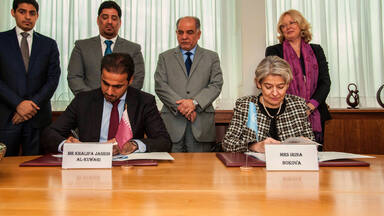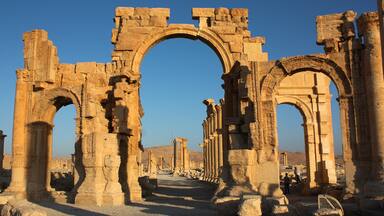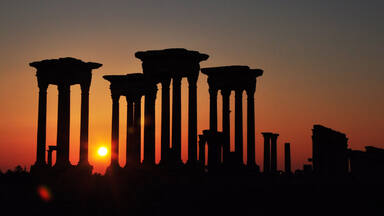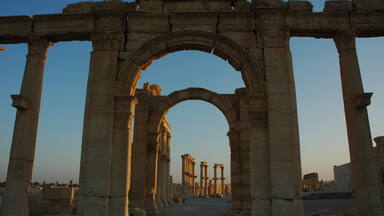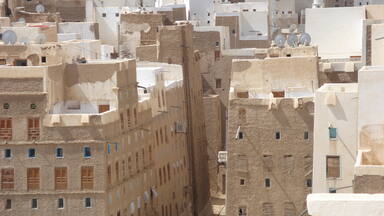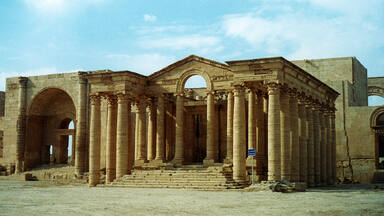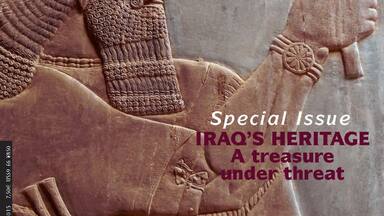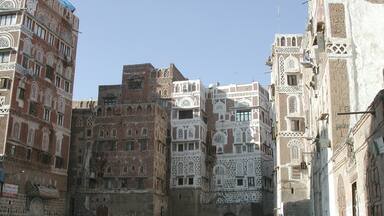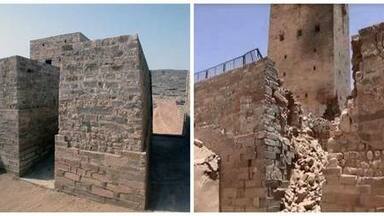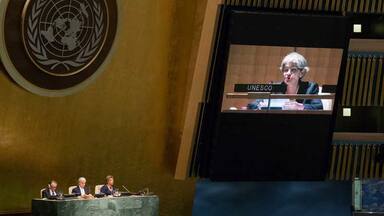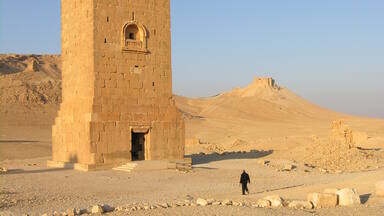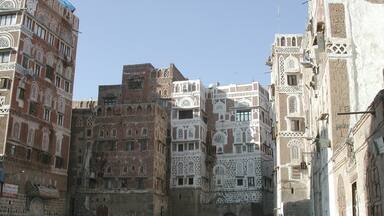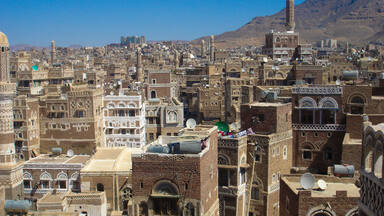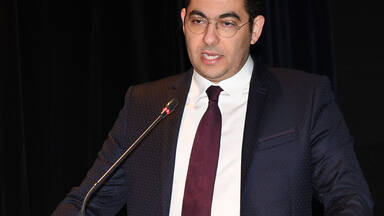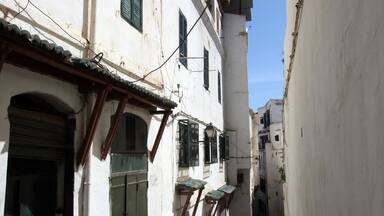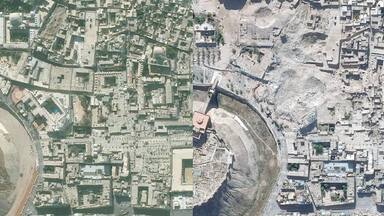The Arab States region is rich in its cultural and natural heritage, reflecting a diversity of values and features, and spanning various periods from prehistory to the modern era.
Cultural Properties
Mixed Properties
Natural Properties
In Danger
Delisted
Periodic Reporting Cycle 3
The Third Cycle of Periodic Reporting in the Arab States was launched in 2018 following Decision 41 COM 10A (Krakow, 2017), in accordance with Article 29 of the 1972 Convention Concerning the Protection of the World Cultural and Natural Heritage. The reporting exercise was implemented between September 2018 and July 2019, with the participation of States Parties in the region and the World Heritage properties inscribed on the World Heritage List by the time of launching the exercise in 2018.
All of the 19 States Parties and 82 World Heritage properties (74 cultural properties, 5 natural properties and 3 mixed properties) participated in the exercise, by responding to the online questionnaire. In collaboration with the Arab Regional Centre for World Heritage (ARC-WH), several workshops were organized to facilitate the process, and subsequently, a draft Report and draft Action Plan were prepared in consultation with the World Heritage national focal points and site managers of the region, Advisory Bodies to the World Heritage Committee, and World Heritage experts. The draft Action Plan is based on the analysis of outcomes the Periodic Report, focusing on priority needs and areas that have been highlighted by States Parties. It is an overall framework proposed for States Parties, along with the World Heritage site managers and other stakeholders, to appropriate the Action Plan and decide on the actions that would be relevant for implementation by the respective authorities.
© UNESCO / First workshop for World Heritage site managers (Anglophone countries), 26-27 March 2019, Cairo, Egypt
The Report on the results of the Third Cycle of the Periodic Reporting exercise in the Arab States (Document WHC/21/44.COM/10A) was presented for adoption at the extended 44th session of the World Heritage Committee. The Report and the Third Cycle Regional Action Plan were endorsed by the Committee in Decision 44 COM 10A (Fuzhou / online, 2021).
Cycle 3
Report and Action Plan
![]()
Main results
Arab States Region
Report on the results of the Third Cycle of the Periodic Reporting exercise in the Arab States
![]()
Third Cycle Regional Action Plan
Framework of the Third Cycle Draft Action Plan for the Arab States (2021-2027)
Periodic Reporting Cycle 2
![]()
Main results
Arab States Region
English Français
Report on the Second Cycle of Periodic Reporting in the Arab States
![]()
Action Plan for the Arab States Region
English Français
Action plans developed during the Regional meeting in Rabat (7-9 March 2011) by the Gulf, Maghreb and Middle East sub-regions successively.
Impact of Covid-19 on World Heritage Sites in the Arab States
According to a UNESCO report published in May 2021, the impact of COVID-19 on World Heritage will continue for years.
COVID-19 has impacted all sectors and all regions, and World Heritage properties in the Arab States are no exception. Restrictions on movement of people and access to certain areas, including World Heritage sites, have been imposed. The World Heritage Centre monitors World Heritage site closures due to COVID-19 and updates the global map on the closure of World Heritage sites weekly.
Site Managers
Site Managers of World Heritage sites in the Arab States tell us how they are coping with the crisis.
We would like to thank all our partners in the field for their collaboration. See more Site Manager videos from other regions: Site Managers report on Covid-19.
Read more:
Arab States Partners and Field Offices
Several conservation, protection and capacity building activities in the region are carried out through cooperation between the States Parties, the World Heritage Centre, the Advisory Bodies, UNESCO Offices in the field, and the Arab Regional Center for World Heritage (ARC-WH) in Bahrain. The network of UNESCO partners plays an essential role in the implementation of specific activities at the local and regional levels.
Field Offices in theArab States Region
National Office to Jordan
National Office to Iraq
Regional Bureau for Education in the Arab States - Cluster Office for Lebanon, Syria, Jordan, Iraq and the Palestinian Territories
Regional Bureau for Sciences in the Arab States - Cluster Office for Egypt and Sudan
Cluster Office for Gulf States and Yemen
National Office to Sudan
Cluster Office for Maghreb Region (Algeria, Libya, Mauritania, Morocco and Tunisia)
Our Partners
International Council on Monuments and Sites (ICOMOS)
International Centre for the Study of the Preservation and Restoration of Cultural Property (ICCROM)
International Union for Conservation of Nature (IUCN)
Arab regional Center for World Heritage (ARC-WH)
Arab League Educational, Cultural, and Scientific Organization (ALECSO)
The Islamic World Educational, Scientific and Cultural Organization (ICESCO)
African World Heritage Fund (AWHF)
Decisions (9)
The World Heritage Committee,
- Having examined Document WHC/23/45.COM/10C,
- Recalling Decision 44 COM 10A adopted at its extended 44th session (Fuzhou/Online, 2021),
- Welcomes the progress made in the follow-up on the implementation of the Third Cycle Regional Action Plan for the Arab States (2021-2027);
- Expresses its appreciation to the Arab Regional Centre for World Heritage (ARC-WH) for its follow-up on the implementation of the Action Plan for the Arab States (2021-2027);
- Invites the States Parties to support the implementation of the Action Plan for the Arab States (2021-2027), and to continue their collaboration with the UNESCO World Heritage Centre, the Advisory Bodies and ARC-WH in implementing the related activities;
- Acknowledges with appreciation that the Strategy for World Heritage in Africa was informed by an inclusive consultation process, which included the seven Arab States located in the African Continent, and that it is aligned with the regional Action Plans for Africa and the Arab States;
- Also acknowledges with appreciation that the outcomes of the UNESCO World Conference on Cultural Policies and Sustainable Development – MONDIACULT 2022 (Mexico City, 2022), and the reflections of international conference The Next 50 - The Future of World Heritage in Challenging Times, Enhancing Resilience and Sustainability (Delphi, 2022), have been taken into consideration in the implementation of activities carried out thereafter;
- Reminds the States Parties of the Arab States region, which have not already done so, to submit their Retrospective Statements of Outstanding Universal Value by 1 February 2024 at the latest, as well as clarifications of boundaries by 1 December 2023 at the latest;
- Reiterates its request to the UNESCO World Heritage Centre to monitor the implementation of the Regional Action Plan in view of preparing a mid-cycle assessment report to be presented to the World Heritage Committee at its 46th session.
The World Heritage Committee,
- Having examined document WHC/21/44COM/10A,
- Recalling Decisions 41 COM 10A, 42 COM 10A and 43 COM 10B adopted at its 41st (Krakow, 2017), 42nd (Manama, 2018), and 43rd (Baku, 2019) sessions respectively,
- Commends the efforts of States Parties in the Arab States region in the completion and submission of Section I, and the very high level of completion and submission of Section II of the Periodic Reporting questionnaire;
- Expresses its sincere appreciation to the authorities of Bahrain and Egypt for hosting training workshops, in collaboration with the World Heritage Centre and the Arab Regional Centre for World Heritage (ARC-WH), in the framework of the Third Cycle of Periodic Reporting exercise;
- Also expresses its sincere appreciation to the significant support provided by ARC-WH in facilitating the Periodic Reporting exercise in the Region;
- Welcomes with satisfaction the Third Cycle Regional Report in the Arab States region and encourages the States Parties to widely disseminate it among all relevant stakeholders in the Region;
- Takes note of the planned publication of the Third Cycle Periodic Report in the Arab States region in the World Heritage paper series, subject to the availability of funding resources, and invites States Parties to contribute financially for this purpose;
- Endorses the Third Cycle Regional Action Plan and its three Strategic Objectives, and takes note with appreciation of the joint efforts by the World Heritage Centre, the World Heritage national focal points and sites managers, ARC-WH, and the Advisory Bodies to produce an Action Plan framework in adaptable format, in order to facilitate its appropriation and integration by the States Parties;
- Also encourages the States Parties to appropriate the Action Plan and integrate relevant actions in country or site-specific action plans, as well as to collaborate to ensure the implementation of joint actions;
- Requests the World Heritage Centre, in collaboration with the Advisory Bodies, ARC-WH, and other relevant partners, to provide technical support to States Parties in implementing the Action Plan, when feasible;
- Also requests the World Heritage Centre to monitor the implementation of the Regional Action Plan in view of preparing a mid-cycle assessment report to be presented to World Heritage Committee after three years;
- Further requests the World Heritage Centre to prepare a progress report on the follow-up of the Third Cycle of Periodic Reporting in the Region for examination at its 46th session.
The World Heritage Committee,
- Having examined Document WHC/21/44.COM/10C,
- Recalling Decision 43 COM 10A.3 adopted at its 43rd session (Baku, 2019);
- Welcomes the progress made in the follow-up of the Second Cycle of Periodic Reporting for the Arab States;
- Thanks the Arab Regional Centre for World Heritage for its contribution towards supporting follow-up activities to the Second Cycle of Periodic Reporting in the Arab States;
- Invites the Arab States to increase their cooperation with the World Heritage Centre in order to reinforce the capacities of the national heritage professionals in the field of conservation and management of the World Heritage properties;
- Notes with concern that the safeguarding of cultural and natural heritage in countries of the region which are affected by conflicts remains one of the priorities and requires more human and financial resources;
- Reminds the Arab States which have not already done so to submit their Retrospective Statements of Outstanding Universal Value by 1 February 2022 at the latest, as well as clarifications of boundaries by 1 December 2021 at the latest.
The World Heritage Committee,
- Having examined Document WHC/19/43.COM/10A,
- Recalling Decision 41 COM 10B.3 adopted at its 41st session (Krakow, 2017);
- Welcomes the progress made in the follow-up of the Second Cycle of Periodic Reporting for the Arab States;
- Thanks the Arab Regional Centre for World Heritage (ARC-WH), based in Bahrain, for its contribution towards supporting follow-up activities to the Second Cycle of Periodic Reporting in the Arab States;
- Invites the Arab States to increase their cooperation with the World Heritage Centre in order to reinforce the capacities of the national heritage professionals in the field of conservation and management of the World Heritage properties;
- Notes with concern that the safeguarding of cultural and natural heritage in countries of the region which are affected by conflicts remains one of the priorities of the Regional Programme and requires more human and financial resources;
- Reminds the Arab States which have not already done so to submit their Retrospective Statements of Outstanding Universal Value by 1 February 2020 at the latest, as well as clarifications of boundaries by 1 December 2019 at the latest;
- Requests the World Heritage Centre to present a progress report on the implementation of the Action Plan for the second cycle of Periodic Reporting for the Arab States region at its 45th session, in 2021.
The World Heritage Committee,
- Having examined Document WHC/16/40.COM/10B,
- Recalling Decisions 35 COM 10C.3, 37 COM 10C.3, 38 COM 10B.3 and 39 COM 10B.3 adopted at its 35th session (UNESCO, 2011), 37th (Phnom Penh, 2013), 38th (Doha, 2014) and 39th (Bonn, 2015) sessions respectively,
- Acknowledges the progress accomplished in the follow-up of the second cycle of Periodic Reporting in the Arab States and encourages them to continue their efforts in the implementation of recommendations;
- Notes with concern that the safeguarding of cultural heritage in countries of the region which are affected by conflicts has become one of the priorities of the Regional Programme;
- Reminds the States Parties about the importance of the Bonn Declaration adopted by the World Heritage Committee at its 39th session (Bonn, 2015);
- Recalls the recommendation of the Chairperson of the 35th session of the World Heritage Committee (UNESCO, 2011), contained in her letter addressed to all the Arab countries, on the establishment of national entities for World Heritage;
- Encourages States Parties to continue the implementation of the Recommendation on the Historic Urban Landscape in order to enhance the conservation of urban heritage sites inscribed on the World Heritage List;
- Thanks the Arab Regional Centre for World Heritage (ARC-WH), based in Bahrain, for its support to the implementation of the Regional Programme and invites Arab States to strengthen their cooperation with the ARC-WH;
- Reminds States Parties which have not already done so to submit their Retrospective Statements of Outstanding Universal Value by 1 February 2017 at the latest, as well as clarifications of boundaries by 1 December 2016 at the latest;
- Requests the World Heritage Centre to present a progress report on the implementation of the Action Plan for Arab States that allows a comparison of implementation status with the approved Action Plan at its 41st session in 2017.
The World Heritage Committee,
- Having examined document WHC-15/39.COM/10B,
- Recalling Decision 35 COM 10C.3 adopted at its 35th session (UNESCO, 2011),
- Acknowledges the progress accomplished in the follow-up of the second cycle of Periodic Reporting in the Arab States and encourages them to continue their efforts in the implementation of recommendations;
- Notes with concern the decrease in the number of focal points and strongly encourages States Parties concerned to designate one focal point for cultural heritage and another one for natural heritage;
- Further encourages States Parties to follow the recommendation of the Chairperson of the 35th session of the World Heritage Committee (Paris, UNESCO, 2011), contained in her letter addressed to all the Arab countries on the establishment of national entities for World Heritage;
- Also encourages States Parties to continue the implementation of the Recommendation regarding the Historic Urban Landscape in order to enhance the conservation of urban heritage sites inscribed on the World Heritage List;
- Notes with satisfaction the commitment and important financial contribution of the Arab Regional Centre for World Heritage (ARC-WH), based in Bahrain, and invites Arab States to strengthen their cooperation with the ARC-WH;
- Further reminds States Parties which have not already done so to submit their Retrospective Statements of Outstanding Universal Value by 1 February 2016 at the latest, as well as clarifications of boundaries by 1 December 2015 at the latest.
The World Heritage Committee,
- Having examined Document WHC-14/38.COM/8E,
- Congratulates the States Parties for the excellent work accomplished in the elaboration of retrospective Statements of Outstanding Universal Value for World Heritage properties in their territories;
- Adopts the retrospective Statements of Outstanding Universal Value, as presented in the Annex of Document WHC-14/38.COM/8E, for the following World Heritage properties:
- China: Wulingyuan Scenic and Historic Interest Area;
- Japan: Gusuku Sites and Related Properties of the Kingdom of Ryukyu; Historic Monuments of Ancient Nara; Historic Villages of Shirakawa-go and Gokayama; The Hiroshima Peace Memorial (Genbaku Dome);
- Sri Lanka: Sinharaja Forest;
- Vietnam: Hoi An Ancient Town; Complex of Hué Monuments;
EUROPE AND NORTH AMERICA:
- Albania: Butrint;
- Armenia: Monastery of Geghard and the Upper Azat Valley;
- Austria: Semmering Railway; Wachau Cultural Landscape;
- Azerbaijan: Walled City of Baku with the Shirvanshah's Palace and Maiden Tower;
- Belarus / Estonia / Finland / Latvia / Lithuania / Moldova / Norway / Russian Federation / Sweden / Ukraine: Struve Geodetic Arc;
- Belgium: Major Town Houses of the Architect Victor Horta (Brussels); Neolithic Flint Mines at Spiennes (Mons); Notre-Dame Cathedral in Tournai; Plantin-Moretus House-Workshops-Museum Complex;
- Bosnia and Herzegovina: Old Bridge Area of the Old City of Mostar;
- Cyprus: Paphos;
- Denmark: Ilulissat Icefjord;
- Finland: Bronze Age Burial Site of Sammallahdenmäki; Fortress of Suomenlinna; Old Rauma; Petäjävesi Old Church; Verla Groundwood and Board Mill;
- Georgia: Historical Monuments of Mtskheta; Upper Svaneti;
- Germany / Poland: Muskauer Park / Park Mużakowski;
- Germany: Abbey and Altenmünster of Lorsch; Bauhaus and its Sites in Weimar and Dessau; Castles of Augustusburg and Falkenlust at Brühl; Collegiate Church, Castle and Old Town of Quedlinburg; Garden Kingdom of Dessau-Wörlitz; Luther Memorials in Eisleben and Wittenberg; Monastic Island of Reichenau; Palaces and Parks of Potsdam and Berlin; Pilgrimage Church of Wies; St Mary's Cathedral and St Michael's Church at Hildesheim; Völklingen Ironworks; Wartburg Castle; Würzburg Residence with the Court Gardens and Residence Square; Zollverein Coal Mine Industrial Complex in Essen;
- Holy See / Italy: Historic Centre of Rome, the Properties of the Holy See in that City Enjoying Extraterritorial Rights and San Paolo Fuori le Mura;
- Holy See: Vatican City;
- Iceland: Þingvellir National Park;
- Italy: Botanical Garden (Orto Botanico), Padua; Ferrara, City of the Renaissance, and its Po Delta; Historic Centre of Florence; Historic Centre of Naples;
- Lithuania / Russian Federation: Curonian Spit;
- Lithuania: Kernavė Archaeological Site (Cultural Reserve of Kernavė);
- Malta: City of Valletta; Hal Saflieni Hypogeum; Megalithic Temples of Malta;
- Mongolia / Russian Federation: Uvs Nuur Basin;
- Montenegro: Natural and Culturo-Historical Region of Kotor;
- Netherlands: Historic Area of Willemstad, Inner City and Harbour, Curaçao;
- Norway: Vegaøyan -- The Vega Archipelago; West Norwegian Fjords – Geirangerfjord and Nærøyfjord;
- Poland: Centennial Hall in Wrocław; Historic Centre of Warsaw;
- Portugal: Historic Centre of Évora; Landscape of the Pico Island Vineyard Culture; Monastery of Alcobaça; Monastery of the Hieronymites and Tower of Belém in Lisbon;
- Russian Federation: Church of the Ascension, Kolomenskoye; Historical Centre of the City of Yaroslavl; Kizhi Pogost;
- Slovakia: Bardejov Town Conservation Reserve; Vlkolínec;
- Slovenia: Škocjan Caves;
- Spain: Archaeological Ensemble of Mérida; Burgos Cathedral; Historic Centre of Cordoba; Monastery and Site of the Escurial, Madrid; Monuments of Oviedo and the Kingdom of the Asturias; Mudejar Architecture of Aragon; Old City of Salamanca; Old Town of Ávila with its Extra-Muros Churches; Old Town of Cáceres; Old Town of Segovia and its Aqueduct; Poblet Monastery; Route of Santiago de Compostela; Royal Monastery of Santa María de Guadalupe; San Cristóbal de La Laguna; Santiago de Compostela (Old Town); Works of Antoni Gaudí;
- Turkey: Archaeological Site of Troy; City of Safranbolu; Hattusha: the Hittite Capital; Xanthos-Letoon;
- Ukraine: Kiev: Saint-Sophia Cathedral and Related Monastic Buildings, Kiev-Pechersk Lavra;
- United Kingdom: Gough and Inaccessible Islands; Henderson Island; Historic Town of St George and Related Fortifications, Bermuda;
- United States of America: Cahokia Mounds State Historic Site; Chaco Culture; Independence Hall; Mesa Verde National Park; Monticello and the University of Virginia in Charlottesville; Statue of Liberty;
LATIN AMERICA AND THE CARRIBBEANS:
- Argentina: Ischigualasto / Talampaya Natural Parks; Los Glaciares; Península Valdés;
- Belize: Belize Barrier Reef Reserve System;
- Bolivia: City of Potosí;
- Brazil: Brasilia; Historic Centre of Salvador de Bahia; Historic Centre of São Luís; Historic Centre of the Town of Diamantina; Historic Centre of the Town of Goiás; Historic Centre of the Town of Olinda; Historic Town of Ouro Preto; Sanctuary of Bom Jesus do Congonhas;
- Colombia: Los Katíos National Park;
- Costa Rica / Panama: Talamanca Range-La Amistad Reserves / La Amistad National Park;
- Cuba: Archaeological Landscape of the First Coffee Plantations in the South-East of Cuba; San Pedro de la Roca Castle, Santiago de Cuba; Urban Historic Centre of Cienfuegos; Viñales Valley;
- Dominican Republic: Colonial City of Santo Domingo;
- Guatemala: Tikal National Park;
- Panama: Coiba National Park and its Special Zone of Marine Protection; Fortifications on the Caribbean Side, Portobelo and San Lorenzo;
- Suriname: Central Suriname Nature Reserve; Historic Inner City of Paramaribo;
4. Decides that retrospective Statements of Outstanding Universal Value for World Heritage properties in Danger will be reviewed by the Advisory Bodies in priority;
5. Further decides that, considering the high number of retrospective Statements of Outstanding Universal Value to be examined, the order in which they will be reviewed by the Advisory Bodies will follow the Second Cycle of Periodic Reporting, namely:
- World Heritage properties in the Arab States;
- World Heritage properties in Africa;
- World Heritage properties in Asia and the Pacific;
- World Heritage properties in Latin America and the Caribbean;
- World Heritage properties in Europe and North America;
6. Takes note that the World Heritage Centre is in the process of harmonising all sub-headings in the adopted Statements of Outstanding Universal Value and, as appropriate, reflects name changes of World Heritage properties throughout the text of the Statements as requested by the Committee at its 37th session, and requests the World Heritage Centre to also update the size of the property and/or its buffer zone, as appropriate, following subsequent Decisions of the World Heritage Committee concerning Minor Boundary Modifications.
7. Requests the States Parties to provide support to the World Heritage Centre for translation of the adopted Statements of Outstanding Universal Value into English or French respectively, and finally requests the Centre to upload the two language versions on its website.
The World Heritage Committee,
- Having examined document WHC-14/38.COM/10B,
- Recalling Decision 35 COM 10C.3, adopted at its 35th session (UNESCO, 2011),
- Takes note of the progress accomplished in the follow-up of the Second Cycle of Periodic Reporting in the Arab States and encourages them to continue their efforts in the implementation of its recommendations;
- Commends the States Parties of the Arab Region for their commitment and thanks all focal points for their effective participation and involvement;
- Notes with satisfaction the increased number of focal points designated for issues related to natural heritage and reiterates its request to those States Parties that have not yet done so yet to designate a focal point for nature;
- Also encourages the States Parties to follow the recommendation of the Chairperson of the World Heritage Committee (June 2011), in her letter to the Arab States regarding the establishment of national entities for World Heritage;
- Further encourages the States Parties to continue in the implementation of the Recommendation on the Historic Urban Landscape, in order to enhance the conservation of urban ensembles inscribed on the World Heritage List;
- Also notes with appreciation the commitment and important financial contribution of the Arab Regional Centre for World Heritage (ARC-WH), based in Bahrain, to projects aiming at developing the implementation of the Convention in the Arab States and invites the Arab States to reinforce their cooperation with the ARC-WH;
- Reminds States Parties which have not already done so to submit their Retrospective Statements of Outstanding Universal Value by 1 February 2015 at the latest, as well as clarifications of boundaries by 1 December 2014 at the latest.
The World Heritage Committee,
1. Having examined Document WHC-13/37 COM/10C ,
2. Recalling Decision 35 COM 10C.3 , adopted at its 35th session (Brasilia, 2011) ,
3. Takes note of the progress accomplished in the follow-up of the second cycle of Periodic Reporting in the Arab States;
4. Commends the States Parties of the Arab Region for their commitment and thanks especially all focal points for their effective participation and involvement;
5. Notes with satisfaction the designation of focal points for natural heritage related issues and requests the States Parties which have not yet done so to designate a focal point for nature;
6. Encourages the States Parties to follow the recommendation of the Rabat meeting regarding the establishment of national entities for World Heritage;
7. Also thanks the Arab Regional Centre for World Heritage (ARC-WH), based in Bahrain, for its commitment and its important financial support to projects aiming at developing the implementation of the Convention in the Arab States and invites the latter to reinforce their cooperation with the Regional Centre;
Reiterates its request to the Arab States Parties to submit the remaining retrospective Statements of Outstanding Universal Value, no later than 1 February 2014 , and boundary clarifications for their properties, no later than 1 December 2013
Read more about the decision














